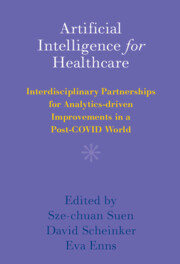 Artificial Intelligence for Healthcare
Artificial Intelligence for Healthcare from Part II - Optimizing Healthcare Systems
Published online by Cambridge University Press: 21 April 2022
Mathematical models may be used to optimize the decision of when to screen for cancer and how invasive a test to use, for example a biopsy or a biomarker. Partially observable Markov decision process (POMDP) models may be used to optimize screening decisions based on a patient's belief state, which is calculated using Bayesian updating and comprises a patient's complete history of biomarker test results. POMDPs can be used to determine how, if at all, biomarkers should be used for cancer screening in order to maximize quality-adjusted life years, a population health measure of disease burden that incorporates both the quality and quantity of life.
To save this book to your Kindle, first ensure [email protected] is added to your Approved Personal Document E-mail List under your Personal Document Settings on the Manage Your Content and Devices page of your Amazon account. Then enter the ‘name’ part of your Kindle email address below. Find out more about saving to your Kindle.
Note you can select to save to either the @free.kindle.com or @kindle.com variations. ‘@free.kindle.com’ emails are free but can only be saved to your device when it is connected to wi-fi. ‘@kindle.com’ emails can be delivered even when you are not connected to wi-fi, but note that service fees apply.
Find out more about the Kindle Personal Document Service.
To save content items to your account, please confirm that you agree to abide by our usage policies. If this is the first time you use this feature, you will be asked to authorise Cambridge Core to connect with your account. Find out more about saving content to Dropbox.
To save content items to your account, please confirm that you agree to abide by our usage policies. If this is the first time you use this feature, you will be asked to authorise Cambridge Core to connect with your account. Find out more about saving content to Google Drive.